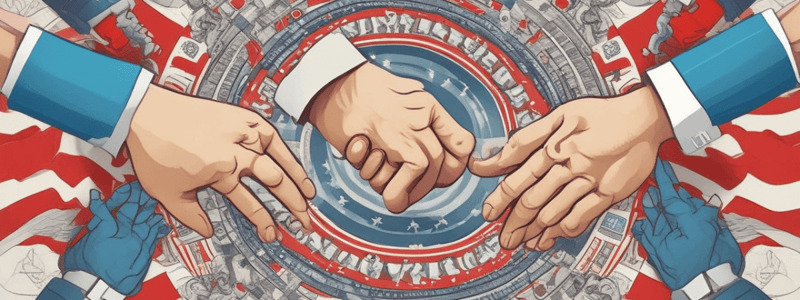Podcast
Questions and Answers
What is national unity essential for?
What is national unity essential for?
- Promoting individual liberties
- Economic development and social welfare
- Establishing a democratic system of government
- A nation's stability, prosperity, and security (correct)
Which of the following is a type of democracy?
Which of the following is a type of democracy?
- Totalitarianism
- Authoritarianism
- Monarchy
- Representative democracy (correct)
What is the primary purpose of a system of checks and balances in a democratic system?
What is the primary purpose of a system of checks and balances in a democratic system?
- To ensure the stability of the government
- To ensure the protection of individual liberties (correct)
- To promote national unity
- To provide a framework for economic development
What is positive liberty?
What is positive liberty?
Which of the following factors promotes national unity?
Which of the following factors promotes national unity?
What is the relationship between national unity and democracy?
What is the relationship between national unity and democracy?
What is the primary purpose of liberty?
What is the primary purpose of liberty?
Which of the following is a key principle of democracy?
Which of the following is a key principle of democracy?
Flashcards are hidden until you start studying
Study Notes
National Unity
- Refers to the state of being united as a nation, where individuals and groups share a common identity, purpose, and loyalty to the country.
- Essential for a nation's stability, prosperity, and security.
- Factors that promote national unity:
- Shared values and beliefs
- Common history and cultural heritage
- Effective governance and leadership
- Economic development and social welfare
- Education and cultural exchange programs
Democracy
- A system of government where power is held by the people, either directly or through elected representatives.
- Key principles of democracy:
- Sovereignty of the people
- Protection of individual rights and freedoms
- Free and fair elections
- Separation of powers and checks and balances
- Accountability and transparency
- Types of democracy:
- Direct democracy (e.g., referendums, town hall meetings)
- Representative democracy (e.g., parliamentary systems, presidential systems)
Liberty
- Refers to the power or scope of acting as one pleases, without being forced or restricted by external circumstances.
- Types of liberty:
- Negative liberty: freedom from external interference or coercion (e.g., freedom from slavery, freedom of speech)
- Positive liberty: freedom to pursue one's goals and aspirations (e.g., freedom to pursue education, freedom to start a business)
- Liberty is essential for:
- Personal growth and development
- Innovation and creativity
- Economic prosperity
- Social progress and justice
Relationship between National Unity, Democracy, and Liberty
- National unity is often seen as a prerequisite for democracy, as a unified nation is more likely to have a stable and functional democratic system.
- Democracy is essential for protecting individual liberties, as it provides a system of checks and balances to prevent abuse of power.
- Liberty is a fundamental aspect of democracy, as it allows individuals to participate in the democratic process and make informed decisions about their lives.
National Unity
- National unity is the state of being united as a nation, where individuals and groups share a common identity, purpose, and loyalty to the country.
- It is essential for a nation's stability, prosperity, and security.
- Shared values and beliefs, common history and cultural heritage, effective governance and leadership, economic development and social welfare, and education and cultural exchange programs promote national unity.
Democracy
- Democracy is a system of government where power is held by the people, either directly or through elected representatives.
- Sovereignty of the people, protection of individual rights and freedoms, free and fair elections, separation of powers and checks and balances, and accountability and transparency are key principles of democracy.
- There are two types of democracy: direct democracy (e.g., referendums, town hall meetings) and representative democracy (e.g., parliamentary systems, presidential systems).
Liberty
- Liberty refers to the power or scope of acting as one pleases, without being forced or restricted by external circumstances.
- There are two types of liberty: negative liberty (freedom from external interference or coercion) and positive liberty (freedom to pursue one's goals and aspirations).
- Liberty is essential for personal growth and development, innovation and creativity, economic prosperity, and social progress and justice.
Relationship between National Unity, Democracy, and Liberty
- National unity is often seen as a prerequisite for democracy, as a unified nation is more likely to have a stable and functional democratic system.
- Democracy is essential for protecting individual liberties, as it provides a system of checks and balances to prevent abuse of power.
- Liberty is a fundamental aspect of democracy, as it allows individuals to participate in the democratic process and make informed decisions about their lives.
Studying That Suits You
Use AI to generate personalized quizzes and flashcards to suit your learning preferences.




